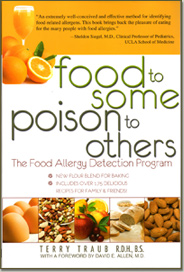frequently asked questions
We have been hearing a great deal lately from the press about the connection between Autism and Gluten and Casein removal from the diet. Does your book address this disease?
Some researchers are excited about the preliminary results with Autism children after removing Gluten and Casein products from their diets. Initial reports show that some of these children are improving socially and with their speech. The theory is that Autism is very much connected with the GI (Gastro-Intestinal) tract. These children cannot properly digest gluten that are in many flours or casein that is in cow's milk. It is also suggested that when these foods are introduced in to the Autism's child's intestine it acts as an opiate (or poison) to the child. A great deal of research still needs to be done. But yes, my book includes gluten-free recipes and dairy-free recipes. But I need to be more specific about the type of dairy products I use and the difference between the cow's milk and goat and sheep's milk. First I would like to point out that dairy cows are feed grains (do the grains have hormones in them), and their milk requires pasteurization. Goats and sheep are feed grass and their milk does not need to be pasteurized. So no chemical change happens to the milk. The particular protein that the press and researchers are talking about is the alpha s1-casein protein and the beta casein protein. The genetic wiring for both cows and goats are very different. While goats do have casein it is not the s1-casein variety and goats have anti-inflammatory compounds that seem to make the goats milk easier to digest. In cases of compromised intestines, goat's milk has been found to be easier to digest. Sheep are very like the goats but their milk is used mainly for cheese. However, parents of Autism children may not want to take the chance. I still have many recipes that use other milk substitutes such as soy milk, almond milk and rice milk. For more information about Autism contact the Autism Research Institute at www.ARI.com and Autism Web at www.autismweb.com
What about Food Allergies and Asthma. Is there any new research on this?
The American Academy of Allergy, Asthma, and Immunology states that "Reactions to food can manifest as skin irritation, asthma or stomach upset." But I found the newest information from the AAAAI to be the most interesting. Findings indicate is a relationship between asthma and GERD (Gastro Esophageal Reflux Disease). According to the research if you have asthma, you have a 70% chance of also having GERD. What happens when an asthma attacks happen is changes in the chest occur that cause the esophageal sphincter to relax. Acid from the stomach is coming up while the child or adult is coughing up mucus plugs. It is estimated that 19 million children and adults suffer from GERD and it is being ignored. However, I have noticed that some of the doctors are starting to connect the research and have taken their patients that have GERD off wheat and other gluten products. For more information you can contact the American Academy of Allergy, Asthma and Immunology at www.AAAAi.com and the American Gastroenterological Association at www.gastro.com. More allergy resources are found in Appendix C of my book.
Your sons and your husband all have Celiac disease. Could you explain what Celiac is and how it affects the body?
Celiac disease is an autoimmune heredity disease that has no cure. The only treatment is abstinence of wheat and other flours containing gluten. The Celiac name refers to the tiny villa found in the lining of the intestine. When an allergic/intolerant person digests gluten the intestine reacts by causing the villa to lie down and stop the absorption of any nutrients. There by causing malnutrition and other diseases, such as: Osteoporosis, failure to thrive, slow growth, bone pain, fatigue, anemia, Dermatitis Herpetiformis, thyroid disease and many more. It usually shows up as diarrhea or constipation with stomach bloating. But Celiac disease can go into other organs of the body. In my youngest son's case it first was in his GI(Gastro Intestinal) tract then it went into his respiratory system showing up as severe asthma, then in his twenties it went back to the GI tract showing up as IBS. When he went off wheat again, not only did the symptoms of IBS disappear, but so did the symptoms of GERD. In my husband's case he had severe asthma until he was about 30 years old, what we did not connect until later was that time was when we were cooking gluten-free menus for the boys. Later after the boys started eating wheat again, he started to show symptoms of GERD which he had to have an operation to correct. Two years ago, he started to show symptoms of Celiac GI distress. As soon as he went off wheat and dairy products he recovered.
One important point that I want to emphasis: Once the diagnosis of Celiac Disease or Intolerance is made, the individual needs to realize it takes a least a year for the intestine to recover. Just because you have gone off wheat does not mean the intestine will react correctly. The stomach is still compromised for that length of time. For more information contact the Celiac Disease Foundation at www.celiac.org/cdf
This information is not intended to replace the advice or consul of your physcian.
All information and recipes ©2008 - 2009 by Terry Traub, site designed by Computer Firemen.


